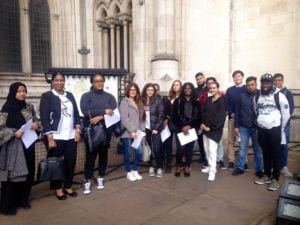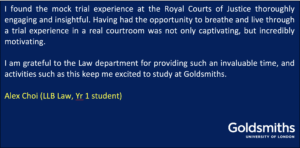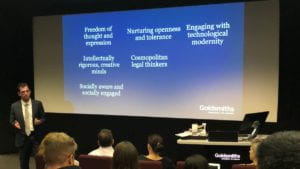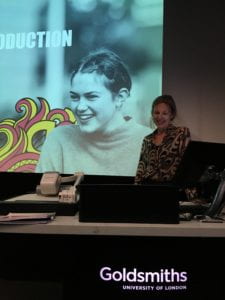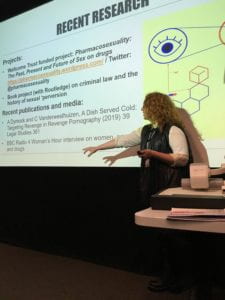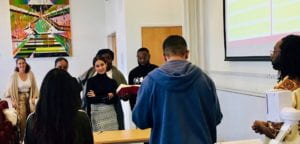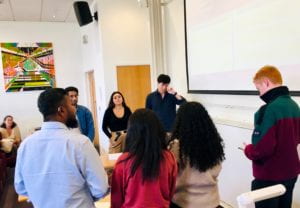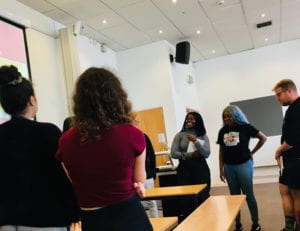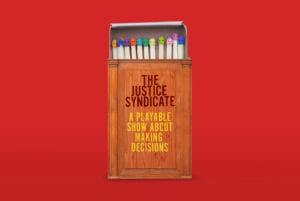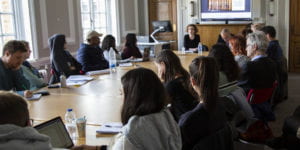
Goldsmiths Law and the Britain in Europe thinktank were delighted to welcome to the College one of the UK’s leading specialists in Public, EU and human rights law, Matrix Chambers’ Jessica Simor QC, who was counsel in the first Miller case, representing the second Claimant, Dos Santos, and the Executive Partner of leading law firm Mishcon de Reya (and Head of Private there), James Libson, who had also been involved in the first Miller case and led the Mishcon legal team on the second Miller case, where the UK Supreme Court found that the Prime Minister’s decision to prorogue Parliament was ‘unlawful’ and its ‘effect upon the fundamentals of our democracy was extreme’.
James and Jessica provided expert analysis on the legal work that went into and made possible the historic Miller cases, before reflecting on next steps in the fluid Brexit process.
Jessica Simor started by noting that she didn’t think either the first or second Miller cases would actually happen. It had not occurred to her that the Government would do anything else than go to Parliament, she said, in relation to the first Miller case. It ‘seemed like a crazy idea’ that the Prime Minister would close Parliament, she observed on the second Miller case.
‘There should have been consultation, reflection, risk assessment of different options’, she insisted, ‘but instead there was public hysteria in the UK’. Debate was dominated by a ‘betrayal, honour, respect’ rhetoric, making the whole process become emotion led. So private individuals, like Gina Miller, had to step in.
On Miller (2), Jessica stressed that the government offered no justification for a 5 week prorogation (when prorogation usually lasted 4 days), adding that, had Boris Johnson provided a justification, the Court would have probably found it much more difficult to decide the case in the way that it did.
James Libson offered his reflection on how ‘our Constitution is being tested in these times’, but the upside of the otherwise convoluted Brexit process was that certain aspects of our constitutional system were working.
Giving an intriguing insight on Miller (2), James observed that in the summer of 2019 the focus initially was not on prorogation, until Boris Johnson started speaking openly about it. To Gina Miller and others, prorogation certainly looked a potentially serious case of executive overreach. It was their view that Boris Johnson’s advice to the Queen was challengeable.
Mishcon wrote to Boris Johnson to ask what position he would take on prorogation, seeking assurances on behalf of Gina Miller. His response did not provide the categoric assurances required, according to Gina Miller. This was the first step in the process that eventually led to the historic prorogation judgment.
James added that he was confident Ginna Miller would win the first Miller case, expressing the view that the Supreme Court Justices did not feel they were entering the political arena with that case. But with the prorogation case, he was ‘not nearly as confident’. Then the Government made significant mistakes such as the Prime Minister not giving evidence.
On the effect of the two cases on Gina Miller, James explained that the litigants involved in these cases had ‘brought upon themselves a whole set of risks’ that litigants shouldn’t be facing, and that the abuse that Gina Miller was subjected to was ‘absolutely abhorrent’ and she had been ‘extraordinarily brave’.
On the way forward with Brexit, Jessica Simor insisted that a confirmatory Referendum could be held in 9 weeks, if the need for a campaign and testing of the question were removed. She also predicted that it would be impossible to pass the legislation needed to give legal effect to a potential deal until the end of October. We have now seen that the lack of time to fully debate the Withdrawal Agreement Bill in Parliament is what stopped the legislation in its tracks.
Referring to the prospect of a second referendum, James Libson explained that it seemed ‘a realistic outcome now, a sign of the impossibility to predict what’s going to happen next’.
